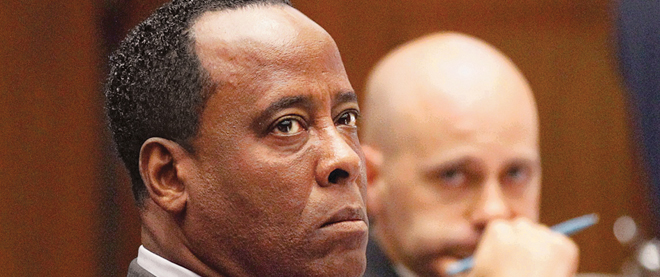How did Michael Jackson die?
Lorazepam? Propofol? It’s clear the King of Pop was a mess.
Mario Anzuoni-Pool/Getty Images
Share

As the legal team for Dr. Conrad Murray prepares to make its case, a new toxicology report could break the last leg in the defence of Michael Jackson’s embattled former physician. Conducted by the Los Angeles County coroner at the request of the prosecution, the report concluded that the amount of lorazepam found in the late pop star’s body was “totally inconsistent with oral consumption of lorazepam tablets”—contradicting one argument advanced by Murray’s defence that Jackson, exhausted from rehearsing for his comeback tour, swallowed eight tablets of the anti-anxiety drug the day he died.
The 58-year-old physician has pleaded not guilty to involuntary manslaughter in the June 25, 2009, death of the pop legend, who died at his rented Los Angeles home as he prepared for a series of 50 sold-out concerts at London’s O2 Arena. On Aug. 28, 2009, the coroner ruled that Jackson died of an acute intoxication of propofol, a powerful anaesthetic, in combination with a cocktail of drugs, including lorazepam.
In a two-hour interview with LAPD detectives taped two days after Jackson’s death and presented in court, Murray described the insomniac pop star begging for his “milk,” the slang for propofol, the morning he died. The doctor admitted he administered a daily intravenous drip in the two months leading up to his death. Concerned that Jackson was addicted, Murray said he tried to “wean him off” propofol in the three days before his death by giving him lorazepam and other drugs. While Murray’s defence team abandoned one theory that Jackson orally administered the lethal dose of propofol himself, it still maintains he used a syringe to inject propofol through a catheter in his leg, and took lorazepam while Murray was out of the room—creating a “perfect storm in his body that killed him instantly,” according to Murray’s lead lawyer, Ed Chernoff.
When the defence launches, it will be up to the jury to decide the fate of Murray. Thrust into the spotlight from humble beginnings, he was born in Grenada, and grew up in Trinidad and Tobago with his mother before moving to the U.S. in 1980 to enroll at Texas Southern University, later graduating from Nashville’s Meharry Medical College in 1989. Murray first met Jackson in 2006, when he treated two of Jackson’s children at his Las Vegas clinic. Six weeks before his death, Jackson hired Murray as a personal physician, with a reported fee of $150,000 per month.
Murray faces up to four years in prison and the loss of his medical licence if convicted, but could spend little to no time behind bars due to a new California sentencing law that makes non-violent convicts in county jails—where he would likely end up—eligible for house arrest based on their criminal history and risk to the community.
It is not known whether Murray, who has remained silent throughout the trial, will take the stand in his own defence. But on Oct. 7, the jury listened to Murray’s interview with detectives, where he relayed to police what would be Jackson’s last desperate pleas for sleep as he grasped at his comeback: “I have to sleep, Dr. Conrad, I have these rehearsals to perform.”